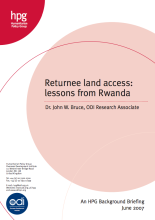/ library resources
Showing items 1 through 8 of 8.Because of their lower social and economic status, as well as physiological needs, women are often more vulnerable to nutritional problems. When it comes to sharing food resources in the home, women and girls can lose out.
There are multiple obstacles to the economic empowerment of women in Africa. For example, limited access to productive resources such as land, seed and fertiliser means that women may be unable to benefit from the expansion of trade in agricultural products.
Current momentum around women's economic empowerment offers huge scope for bringing about real changes in women's lives. But earning an income or having access to credit cannot be assumed to bring automatic benefits for women.
This background briefing reports on a study of land access
for returnees in Rwanda, and the impacts of land access
policies in the post-conflict period. It also seeks to
understand better the roles international humanitarian
Law N° 18/2007 of 19th April 2007 Relating to Expropriation in the Public Interest.
Published on the 19 July 2007
Presidential order N° 61/01 of 21/11/2008 Modifying and Complementing the Presidential Order N° 30/01 of 29/06/2007 Determining the Number of Years of Land Lease.
Published on the 1 December 2008.
This paper examines land tenancy systems and tenant contracts in Rwanda, with
respect to socioeconomic contexts. Our research in southern and eastern Rwanda produced
data suggesting that land borrowing with fixed rents has been generally practiced, and that rent
This background briefing reports on a study of land access for returnees in Rwanda, and the impacts of land access policies in the post-conflict period.
Land Library Search
Through our robust search engine, you can search for any item of the over 73,000 highly curated resources in the Land Library.
If you would like to find an overview of what is possible, feel free to peruse the Search Guide.






